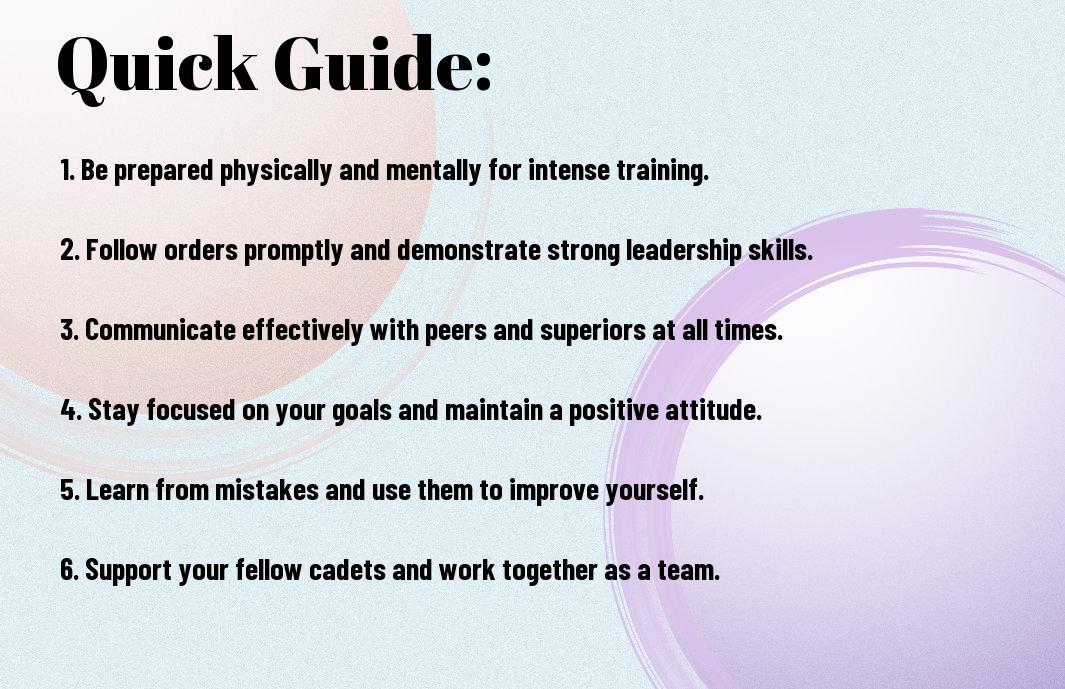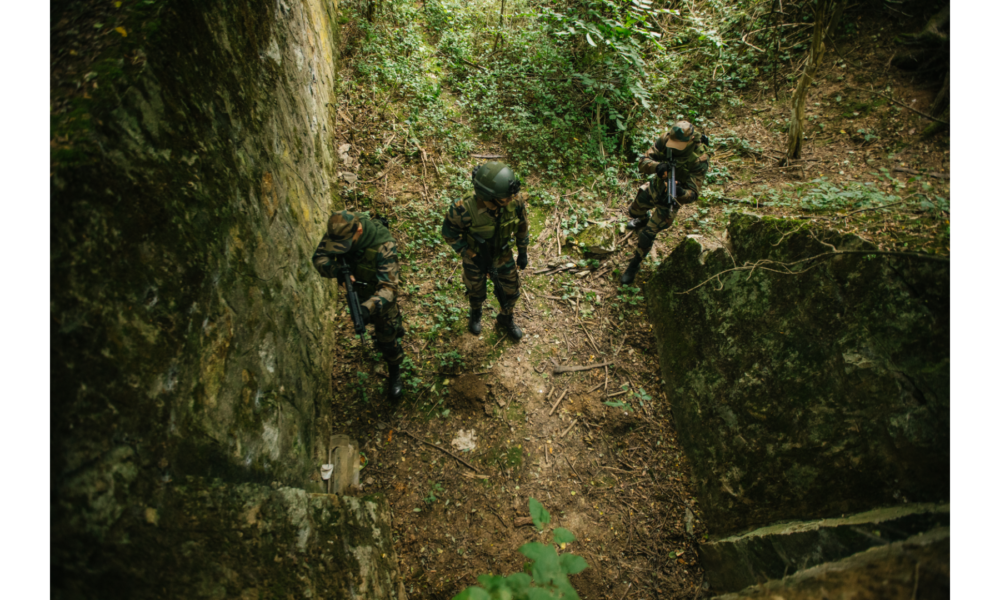Embarking on the Officer Cadet Course is a challenging yet rewarding journey for those pursuing a military career. This comprehensive guide is designed to equip you with the imperative knowledge and skills needed to not only survive but thrive during this demanding training programme. From mastering physical fitness tests to honing leadership and decision-making abilities, the Officer Cadet Course will push you to your limits, both mentally and physically. With insider tips and strategies, this guide will help you navigate through the toughest aspects of the course, prepare you for the most gruelling challenges, and ultimately emerge as a resilient and capable officer. Are you ready to conquer the Officer Cadet Course? Let’s begin.
Key Takeaways:
- Physical fitness is key. Prioritise your physical fitness to meet the demands of the course.
- Mental resilience is crucial. Develop resilience to overcome challenges and stress during the course.
- Time management is essential. Efficiently manage your time to balance studies, training, and personal tasks.
- Teamwork is vital. Work collaboratively with your peers to succeed in group activities and tasks.
- Stay Committed and Motivated: Maintain your dedication and motivation to persevere through the course’s demands.

Types of Challenges Faced
Embarking on the Officer Cadet Course is no easy feat. Aspiring officers will encounter a variety of challenges that will test their physical, mental, and emotional resilience. It is important to understand the different types of challenges that lie ahead to prepare effectively.
These challenges can be broadly categorised into physical demands and mental and emotional stressors. Each type presents its own set of obstacles that must be overcome to complete the Officer Cadet Course and emerge as a capable officer ready to lead.
| Physical Demands of the Course | Mental and Emotional Stressors |
| Endurance training | Pressure to perform |
| Obstacle courses | Isolation from family and friends |
| Weapons training | High-stakes decision-making |
| Field exercises | Stressful simulated scenarios |
| Physical fitness tests | Emotional resilience training |
Physical Demands of the Course
The Officer Cadet Course demands a high level of physical fitness and endurance from all cadets. Endurance training, obstacle courses, weapons training, field exercises, and regular physical fitness tests are just some of the challenges cadets will face. These activities test not only physical strength but also mental determination and stamina.
Any aspiring officer must be prepared to push themselves to their limits physically, often in demanding and strenuous conditions. Building and maintaining peak physical fitness is crucial to meeting the physical challenges head-on and successfully navigating the course.
Mental and Emotional Stressors
Mental and emotional stressors can be just as challenging, if not more so, than the physical demands of the course. The pressure to perform, isolation from family and friends, high-stakes decision-making, exposure to stressful simulated scenarios, and the need for emotional resilience training all contribute to the mental and emotional challenges faced by cadets.
Cadets must develop strong coping mechanisms, resilience, and the ability to make sound decisions under pressure. Managing stress and maintaining mental well-being are critical aspects of completing the Officer Cadet Course.
Step-by-Step Guide to Training Preparation
Preparing for the Officer Cadet Course requires a structured approach to training. This step-by-step guide will help you navigate the challenges of physical and mental preparation before you begin this rigorous course.
| Physical Fitness Regimen | Mental Toughness Development |
|
1. Establish a regular exercise routine that includes cardiovascular exercises, strength training, and flexibility exercises. |
1. Practice resilience-building exercises such as mindfulness meditation and visualisation techniques. |
|
2. Gradually increase the intensity of your workouts to build endurance and strength, mimicking the physical demands of the course. |
2. Challenge yourself with mental exercises that push you out of your comfort zone, such as problem-solving tasks under pressure. |
Physical Fitness Regimen
Physical fitness is a crucial aspect of preparing for the Officer Cadet Course. Regular exercise is important to build the strength and endurance required to tackle the physical challenges ahead. Make sure to focus on cardiovascular fitness, strength training, and flexibility to ensure you are in peak physical condition.
Mental Toughness Development
Developing mental toughness is just as important as physical fitness when preparing for the Officer Cadet Course. Resilience-building exercises such as mindfulness meditation and visualisation techniques can help you stay focused and composed in high-pressure situations. By challenging yourself mentally with tasks that require problem-solving under stress, you can build the mental fortitude needed to excel in the course.
Bear in mind, that mental toughness is not about being fearless, but about facing your fears and pushing through challenges with determination and resilience.
Essential Tips for Success
Embarking on the Officer Cadet Course can be a challenging and demanding experience. To navigate through the course successfully, it is imperative to equip yourself with key strategies that will help you excel. Here are some imperative tips to guide you towards success.
Time Management Strategies
When undertaking the Officer Cadet Course, effective time management is crucial. Organisation and planning are your allies in this journey. Allocate specific times for studying, physical training, and rest. Prioritise tasks based on their importance and urgency, and avoid procrastination at all costs.
Furthermore, be adaptable and ready to adjust your schedule as needed. It is important to strike a balance between your various commitments and ensure that you make the most of every moment. Consistency and discipline in managing your time will undoubtedly contribute to your overall success on the course.
Building Effective Relationships with Peers and Instructors
Establishing positive relationships with your peers and instructors is invaluable during the Officer Cadet Course. Communication, respect, and teamwork are imperative components of building effective relationships. Be willing to listen, collaborate, and support others in your cohort.
By fostering a positive and supportive environment, you not only enhance your learning and development but also contribute to the overall cohesion of your unit. Building these relationships will not only benefit you personally but also create a strong foundation for success throughout the course.
Knowing how to navigate challenging situations and conflicts gracefully will be a valuable skill. By demonstrating empathy and understanding, you can overcome obstacles and strengthen your connections with your peers and instructors.
Factors Contributing to Success or Failure
Numerous factors can affect whether a student succeeds or fails in the Officer Cadet Course. Understanding these factors is crucial for those looking to excel in the programme and achieve their goals. Personal discipline and leadership skills play a significant role in determining whether a candidate will succeed or struggle during the course.
The Role of Personal Discipline
Personal discipline is the foundation upon which all success in the Officer Cadet Course is built. Those who exhibit high levels of discipline are more likely to excel in rigorous training and demanding environments. Consistent adherence to rules and regulations, self-motivation, and the ability to stay focused are key attributes that contribute to success. Without personal discipline, candidates may find it challenging to keep up with the pace of the course and may struggle to meet the required standards.
The Impact of Leadership Skills
Having strong leadership skills is another crucial factor that can determine success in the Officer Cadet Course. Candidates who possess effective communication, decision-making, and problem-solving skills are better equipped to handle the challenges of leadership roles within the military. Being able to inspire and motivate others, delegate tasks efficiently, and lead by example are qualities that set successful candidates apart from the rest.
Perceiving leadership skills as a crucial component of military training will help candidates develop the necessary attributes to lead effectively in high-pressure situations. Developing these skills can not only contribute to success in the Officer Cadet Course but also pave the way for a successful military career in the future.
Pros and Cons of the Officer Cadet Experience
Before embarking on the challenging journey of the Officer Cadet Course, it is crucial to weigh the advantages and potential difficulties that come with such an intensive training programme. Understanding both sides of the coin will better prepare you for the rigorous demands of the course and help you make an informed decision about pursuing a career as an officer in the military.
| Advantages | Potential Difficulties |
| 1. Gain leadership skills | 1. Physical and mental challenges |
| 2. Develop discipline and resilience | 2. Long hours and intense training |
| 3. Opportunities for career progression | 3. Personal sacrifices required |
| 4. Learn to work effectively as a team | 4. High levels of stress and pressure |
Advantages of Completing the Course
Completing the Officer Cadet Course equips you with a unique set of skills and qualities that are highly valued in the military and beyond. You will emerge as a confident leader, capable of making tough decisions under pressure and inspiring others to achieve their best. The course provides a solid foundation in discipline and resilience, necessary traits for success in any military or civilian career.
Moreover, successfully graduating from the course opens doors to a range of career opportunities within the armed forces, allowing you to progress through the ranks and take on positions of greater responsibility. The experience gained during the training will shape you into a well-rounded individual with the ability to adapt to challenging situations and thrive in dynamic environments.
Potential Difficulties and How to Overcome Them
While the Officer Cadet Course offers many benefits, it is important to acknowledge the potential difficulties that cadets may face during their training. The demanding nature of the course can present physical and mental challenges, pushing individuals to their limits both emotionally and physically. However, with determination and perseverance, cadets can overcome these obstacles and emerge stronger.
Cadets must maintain a healthy work-life balance and seek support from their peers and instructors when needed. Developing effective stress management techniques and prioritising self-care can help cadets navigate the intense training schedule and demands of the course. Being mindful of, resilience is key to overcoming the challenges that come with the officer cadet experience.
The Ultimate Guide To Surviving The Officer Cadet Course
Surviving an Officer Cadet Course requires a blend of determination, resilience, and strategic planning. This guide provides crucial tips and insights to navigate through the challenges of the course successfully. By understanding the expectations, staying physically and mentally fit, adapting to the military life, and building strong relationships with peers, cadets can increase their chances of not only surviving but excelling in the training. Note, that perseverance and a positive attitude are key in facing the demanding tasks and rigorous training sessions that come with the Officer Cadet Course. By following the advice in this ultimate guide, cadets can tackle obstacles with confidence and emerge as resilient leaders ready to take on future military challenges.
FAQ
Q: What is the Officer Cadet Course?
A: The Officer Cadet Course is a rigorous training programme designed to develop individuals into competent and effective officers in the military.
Q: How long does the Officer Cadet Course last?
A: You will undergo a 38-week Officer Cadet Course to be trained as an Officer for the SAF:
2-week Common Leadership Module: You will be trained together with other cadets from the Army, Navy, Air Force and Digital and Intelligence Service, and learn a common set of values and experiences.
33-week Service Term and Professional Term: You will branch out into your respective service arms and learn leadership and vocational skills relevant to your future deployment.
3-week Joint Term: You will share your experience and training while preparing to be commissioned as SAF Officers.
Q: What are the key components of the Officer Cadet Course?
A: The key components of the Officer Cadet Course include leadership training, physical fitness assessments, tactical skills development, academic study, and field exercises.
Q: How can I prepare for the Officer Cadet Course?
A: To prepare for the Officer Cadet Course, it is recommended to focus on physical fitness, study military history and theory, practice leadership skills, and familiarise yourself with military customs and courtesies.
Q: What should I expect during the Officer Cadet Course?
A: During the Officer Cadet Course, you can expect to undergo intense physical training, academic study, leadership challenges, field exercises, and evaluations to test your readiness to become an officer in the military.







